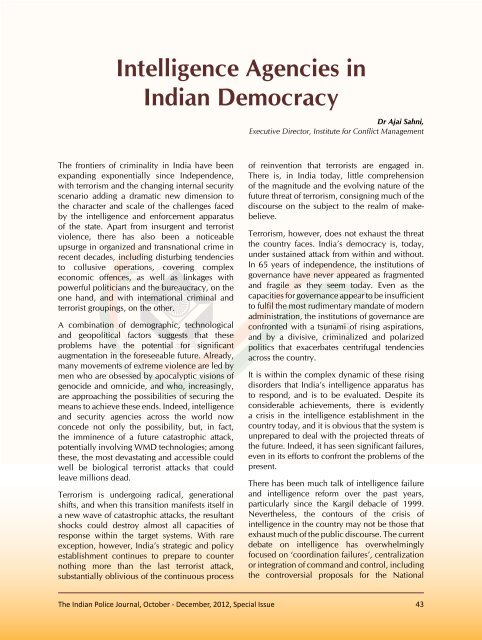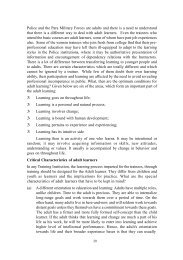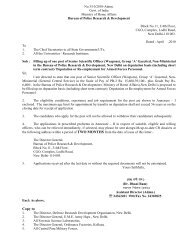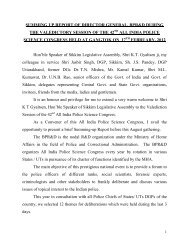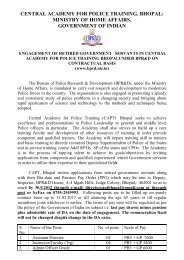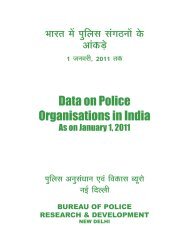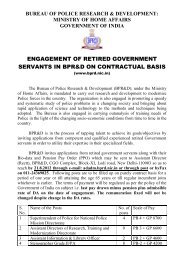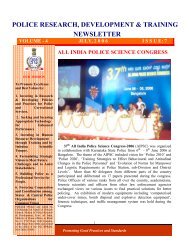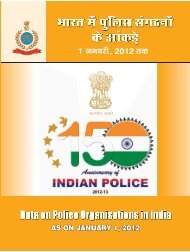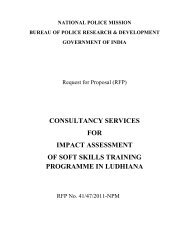Editorial Board Contents - Bureau of Police Research and ...
Editorial Board Contents - Bureau of Police Research and ...
Editorial Board Contents - Bureau of Police Research and ...
You also want an ePaper? Increase the reach of your titles
YUMPU automatically turns print PDFs into web optimized ePapers that Google loves.
Intelligence Agencies inIndian DemocracyDr Ajai Sahni,Executive Director, Institute for Conflict ManagementThe frontiers <strong>of</strong> criminality in India have beenexp<strong>and</strong>ing exponentially since Independence,with terrorism <strong>and</strong> the changing internal securityscenario adding a dramatic new dimension tothe character <strong>and</strong> scale <strong>of</strong> the challenges facedby the intelligence <strong>and</strong> enforcement apparatus<strong>of</strong> the state. Apart from insurgent <strong>and</strong> terroristviolence, there has also been a noticeableupsurge in organized <strong>and</strong> transnational crime inrecent decades, including disturbing tendenciesto collusive operations, covering complexeconomic <strong>of</strong>fences, as well as linkages withpowerful politicians <strong>and</strong> the bureaucracy, on theone h<strong>and</strong>, <strong>and</strong> with international criminal <strong>and</strong>terrorist groupings, on the other.A combination <strong>of</strong> demographic, technological<strong>and</strong> geopolitical factors suggests that theseproblems have the potential for significantaugmentation in the foreseeable future. Already,many movements <strong>of</strong> extreme violence are led bymen who are obsessed by apocalyptic visions <strong>of</strong>genocide <strong>and</strong> omnicide, <strong>and</strong> who, increasingly,are approaching the possibilities <strong>of</strong> securing themeans to achieve these ends. Indeed, intelligence<strong>and</strong> security agencies across the world nowconcede not only the possibility, but, in fact,the imminence <strong>of</strong> a future catastrophic attack,potentially involving WMD technologies; amongthese, the most devastating <strong>and</strong> accessible couldwell be biological terrorist attacks that couldleave millions dead.Terrorism is undergoing radical, generationalshifts, <strong>and</strong> when this transition manifests itself ina new wave <strong>of</strong> catastrophic attacks, the resultantshocks could destroy almost all capacities <strong>of</strong>response within the target systems. With rareexception, however, India’s strategic <strong>and</strong> policyestablishment continues to prepare to counternothing more than the last terrorist attack,substantially oblivious <strong>of</strong> the continuous process<strong>of</strong> reinvention that terrorists are engaged in.There is, in India today, little comprehension<strong>of</strong> the magnitude <strong>and</strong> the evolving nature <strong>of</strong> thefuture threat <strong>of</strong> terrorism, consigning much <strong>of</strong> thediscourse on the subject to the realm <strong>of</strong> makebelieve.Terrorism, however, does not exhaust the threatthe country faces. India’s democracy is, today,under sustained attack from within <strong>and</strong> without.In 65 years <strong>of</strong> independence, the institutions <strong>of</strong>governance have never appeared as fragmented<strong>and</strong> fragile as they seem today. Even as thecapacities for governance appear to be insufficientto fulfil the most rudimentary m<strong>and</strong>ate <strong>of</strong> modernadministration, the institutions <strong>of</strong> governance areconfronted with a tsunami <strong>of</strong> rising aspirations,<strong>and</strong> by a divisive, criminalized <strong>and</strong> polarizedpolitics that exacerbates centrifugal tendenciesacross the country.It is within the complex dynamic <strong>of</strong> these risingdisorders that India’s intelligence apparatus hasto respond, <strong>and</strong> is to be evaluated. Despite itsconsiderable achievements, there is evidentlya crisis in the intelligence establishment in thecountry today, <strong>and</strong> it is obvious that the system isunprepared to deal with the projected threats <strong>of</strong>the future. Indeed, it has seen significant failures,even in its efforts to confront the problems <strong>of</strong> thepresent.There has been much talk <strong>of</strong> intelligence failure<strong>and</strong> intelligence reform over the past years,particularly since the Kargil debacle <strong>of</strong> 1999.Nevertheless, the contours <strong>of</strong> the crisis <strong>of</strong>intelligence in the country may not be those thatexhaust much <strong>of</strong> the public discourse. The currentdebate on intelligence has overwhelminglyfocused on ‘coordination failures’, centralizationor integration <strong>of</strong> comm<strong>and</strong> <strong>and</strong> control, includingthe controversial proposals for the NationalThe Indian <strong>Police</strong> Journal, October - December, 2012, Special Issue 43


